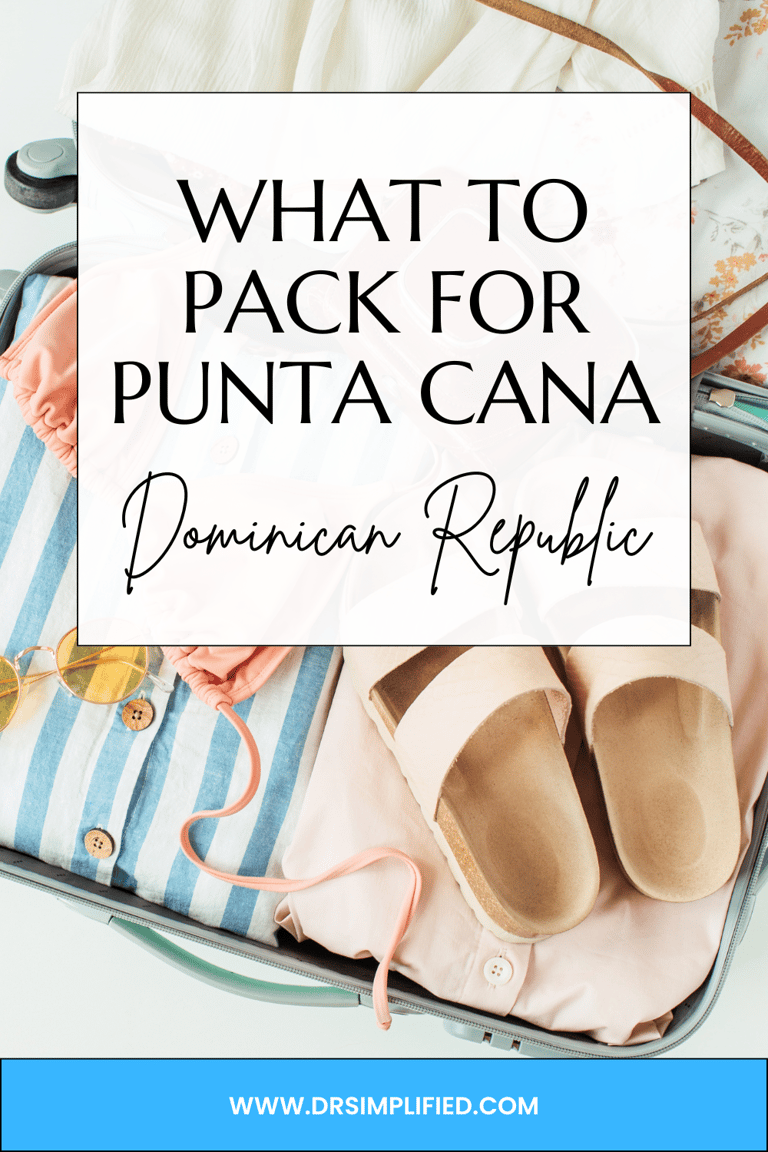dominican CULTURE AND LANGUAGE
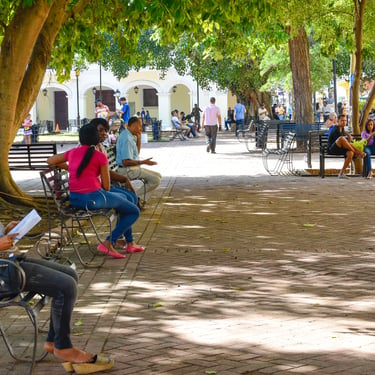
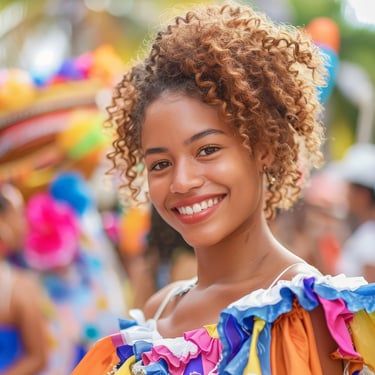
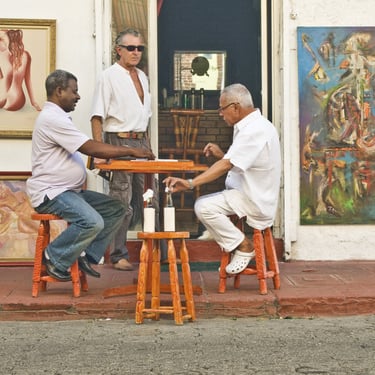
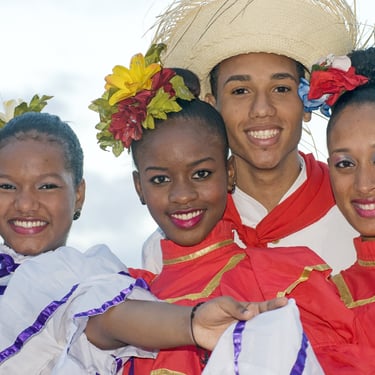
Dominican culture and language are a big part of what makes visiting the country special. Local traditions, everyday customs, and the way people communicate show you a different side of the Dominican Republic beyond its beaches. Spanish is the official language, and knowing a few simple phrases can make conversations easier and more fun. This guide explains the most important cultural etiquette, useful Spanish phrases, and what to expect when exploring the Dominican Republic.
✅Dominican Republic Culture
Dominican culture blends Spanish, African and Taíno influences, shaping unique traditions and a relaxed way of life. Culture is how people live, from their values and customs to the way they connect with others. In the Dominican Republic, this means being warm and welcoming, valuing family, enjoying music, and spending time together.
Some customs may feel different at first, but keeping an open mind will make your trip easier and help you enjoy the experience more.
Culture shocks you might experience when visiting the Dominican Republic.
Dominican Time: Go with the Flow
Time moves differently here. An 8 PM show might actually start closer to 8:30, and tours can leave a bit later than planned. Life here moves at a slower pace, and people value enjoying the moment over sticking to a strict schedule. If something doesn’t start on time, just go with it. Use the extra time to relax, enjoy a drink, or take in the views. If you have important plans like a flight or a tour, double-check the schedule to avoid surprises. Embracing this laid-back vibe will make your trip more enjoyable.
Friendly Vibes Everywhere: Embrace It
Dominicans are naturally warm and welcoming. It’s normal for strangers to strike up conversations with you, whether you’re in line, sitting at a bar, or just walking around. People genuinely enjoy chatting and making visitors feel welcome.
If someone starts a conversation, smile and chat back if you feel comfortable. Knowing a few basic Spanish phrases can make these moments even more fun and show that you appreciate the local culture. Sometimes friendliness might seem like romantic interest, but it’s usually just genuine warmth.
Music Everywhere: Enjoy the Beat
Music is a big part of life here. You’ll hear bachata, merengue, and dembow playing from cars, shops, and even on the beach. It’s lively, loud, and full of energy. For Dominicans, music isn’t just background noise; it’s a way to express joy and celebrate life.
Instead of being bothered by the volume, try to enjoy the vibe. If you’re feeling adventurous, join in on the dancing. Locals will appreciate your enthusiasm, and it’s a great way to experience the culture.
Busy Traffic: Stay Calm
Traffic can feel hectic in the cities, with motorbikes weaving between cars and frequent honking. Here, honking is just communication, like saying “I’m passing by,” not frustration.
If driving feels stressful, take a taxi or book a private transfer. Local drivers know the roads and traffic, so sit back, relax, and enjoy the ride. Treat it as part of the experience and let the experts handle it. Book your transfer here
Urban Realities: Trash in Some Areas
In some cities, you might notice litter on the streets, which can be surprising. Waste management varies by area, but many local groups are working hard to improve cleanliness. Natural spots like beaches, parks, and waterfalls are usually well-kept, so you’ll still find plenty of beautiful places to enjoy.
Focus on the warm, welcoming people and the stunning scenery around you. Always throw your trash away properly and support local clean-up efforts when you can.
Sanky Panky: Flirty Vibes
In tourist areas, you might meet locals who are friendly and flirtatious. Sometimes these connections are genuine, leading to friendships or light-hearted romances. Other times, locals may see relationships with visitors as a way to gain financial support.
Enjoy the attention if it feels comfortable, but trust your instincts. If you’re not interested, a polite but clear response usually works. Most people will respect your boundaries if you communicate them kindly.
Language Differences: Learn a Little Spanish
While English is common in tourist areas, many locals mainly speak Spanish, especially outside the resorts. Learning a few basic phrases like “Hola” (hello) or “Gracias” (thank you) can make a big difference. Speaking a bit of Spanish shows respect and often makes interactions more fun.
Don’t worry if your Spanish isn’t perfect; locals usually appreciate the effort and may even help you practice. It’s a great way to connect with the community.
Gender Roles: Appreciate the Hospitality
Traditional gender roles are common here. You might notice women taking on nurturing roles, like preparing meals or helping guests. This isn’t about inequality; it’s a cultural way of showing care and hospitality.
Being open to these customs helps you build positive connections. Simply showing appreciation can make a big difference.
Economic Differences: Keep an Open Mind
The Dominican Republic has a mix of well-developed tourist areas and neighborhoods that may face economic challenges. You might notice differences between luxury resorts and local communities. Instead of feeling uncomfortable, see it as a chance to learn more about the country and its people.
Supporting local businesses when you can helps the community and gives you a more authentic experience. Keeping an open mind and appreciating the diversity will help you connect more meaningfully with locals.
Dominican Culture: Do’s and Don’ts
✅ Do’s
Greet People Properly: Dominicans value greetings. A handshake and eye contact are typical when meeting someone for the first time. Close friends and family often greet with a kiss on the cheek. Smiling and using polite phrases like “Buenos días” (Good morning) or “¿Cómo estás?” (How are you?) make a great impression.
Use Polite Terms: Show respect, especially to elders or strangers, by using “señor” (Mr.) or “señora” (Mrs.). If someone is older or well-regarded, you might hear “Don” or “Doña” before their first name. This shows extra respect and friendliness. This respect also extends to elderly tourists, so being polite goes a long way. For tips on traveling with older family members, check out our article on Traveling with Elderly.
Try the Local Food: If a Dominican offers you food, accept it, even if it’s just a small portion. Refusing could be seen as impolite since sharing food is a sign of hospitality. Dominicans take pride in their flavorful cuisine, which blends Spanish, African, and Taíno influences. Dishes like "mangu" (mashed plantains), "sancocho" (hearty stew), and "mofongo" (garlic-flavored mashed plantains) are must-tries.
Dress Nicely: Appearance is important in the Dominican Republic. While it’s fine to wear swimwear at the beach, dress a bit more conservatively in towns, cities, and religious places. Dominicans often dress well when going out, even casually. When visiting churches or religious sites, make sure your shoulders and knees are covered.
Be Sociable: Engage in light conversation, smile, and show interest. Dominicans enjoy chatting, and building a personal connection often comes before discussing business or other matters.
❌ Don’ts
Don’t Rush: Time is flexible here, and people don’t stress about being exactly on time. Be patient and go with the flow. Relax and enjoy the slower pace.
Don’t Discuss Politics: Topics like politics or the relationship with Haiti can be sensitive. Keep conversations positive and avoid controversial subjects.
Don’t Refuse Hospitality: Even if you don’t drink alcohol or aren’t hungry, politely accepting a small amount shows respect. Hospitality is a big deal in the Dominican Republic.
Don’t Assume Everyone Speaks English: While English is common in tourist areas, learning a few basic Spanish phrases shows respect and effort.
Don’t Misinterpret Friendliness: Dominicans are naturally warm and approachable. A friendly conversation doesn’t necessarily mean romantic interest, especially in tourist spots.
Dominican Culture Highlights
✔️Family is Everything
Family is at the heart of Dominican culture. It is common for several generations to live in the same home, and family gatherings are full of food, conversation, and laughter. Once locals get to know you, they will often treat you like part of the family.
✔️Baseball Fever
Baseball is more than a sport in the Dominican Republic. It is a national passion and an important part of daily life. The country has produced many famous players, and going to a local game is a fun way to experience this excitement up close.
✔️Faith Matters
Religion plays a big role in Dominican life, with most people identifying as Roman Catholic. Protestant communities are also common. When visiting churches or religious sites, wearing respectful clothing is appreciated. Visit La Basílica de Higüey: one of the country’s most iconic landmarks.
✔️Festivals and Celebrations
The Dominican Republic is home to many cultural celebrations. Carnival in February is the most famous, with colorful costumes, music, and dancing across the country. The Merengue Festival in Santo Domingo celebrates the national dance, while the Espíritu Santo festivities in June bring communities together with traditional music, food, and local traditions.
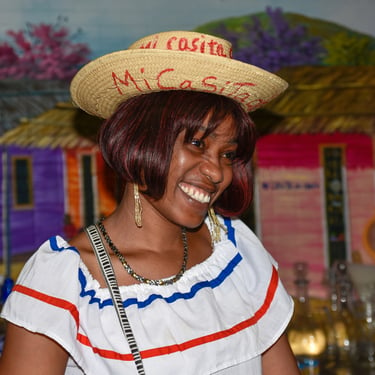
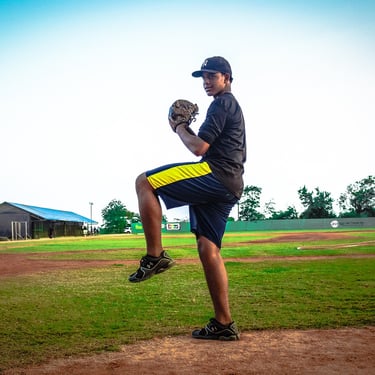
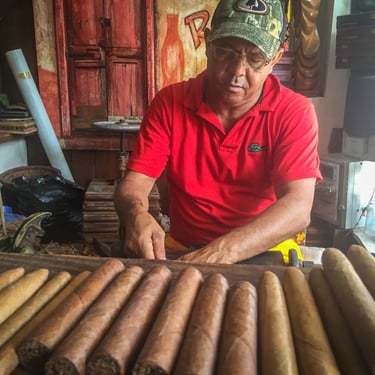
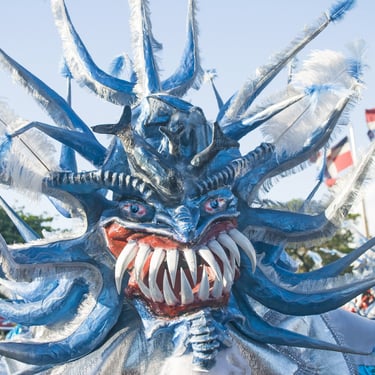
✅Language in the Dominican Republic
The official language of the Dominican Republic is Spanish, and most people speak it every day. In tourist areas like hotels and resorts, English is common, but learning a few Spanish phrases will make conversations friendlier and easier.
Dominican Spanish is a bit different from the Spanish spoken in Spain or other Latin American countries. It has its own accent, unique slang, and expressions that give it a special character. Locals often speak quickly and sometimes drop the “s” at the end of words. For example, instead of saying “Los amigos” (the friends), you might hear “Lo’ amigo’.”
Essential Spanish Phrases for Your Trip to the Dominican Republic
✔️1. Greetings and Basics: Start Your Conversations Right
Learning the basics is the first step to connecting with locals:
Hola (OH-lah) = Hi
¿Cómo estás? (COH-moh ehs-TAHS) = How are you?
Bien, gracias. (Bee-YEN, GRAH-syahs) = Good, thanks.
¿Y tú? (EE TOO?) = And you?
If someone replies with “Tranquilo/a” (trahn-KEE-loh/ah), it means "Chill" or "No worries." It’s a common way Dominicans express that everything’s good – they’re known for their relaxed vibe.
✔️2. Politeness Goes a Long Way: Essential Courtesies
Politeness is highly valued in the Dominican Republic. Use these phrases to make a good impression:
Por favor (por fah-VOR) = Please
Gracias (GRAH-syahs) = Thank you
De nada (deh NAH-dah) = You’re welcome
¡A la orden! (ah-lah OR-den) = At your service
You’ll hear “¡A la orden!” often, especially from shopkeepers or waitstaff. It’s their way of saying they’re happy to help.
✔️3. Food and Drinks: Ordering Like a Local
Dominican food is a highlight of any trip! Here’s how to order like a pro:
Dame un plato de la bandera, por favor. (DAH-meh oon PLAH-toh deh lah bahn-DEH-rah) = Give me the national dish, please (rice, beans, and meat).
¿Tienen mofongo? (TYEH-nen moh-FOHN-goh?) = Do you have mofongo? (You definitely want to try this dish.)
Sin picante, por favor. (Seen pee-CAHN-teh) = No spice, please.
Una cerveza fría, por favor. (OO-nah sehr-VEH-sah FREE-ah) = A cold beer, please. (Presidente is the most popular brand!)
¿Cuánto cuesta el jugo de chinola? (KWAN-toh KWEHS-tah el HOO-goh deh chee-NOH-lah) = How much is the passion fruit juice?
Quiero probar el sancocho. (KYER-oh proh-BAHR el sahn-KOH-choh) = I want to try the sancocho (a hearty stew).
¿Puedo tener el pescado frito? (PWEH-doh teh-NEHR el pehs-KAH-doh FREE-toh) = Can I have the fried fish?
Try to visit a “comedor” (local eatery) for an authentic, budget-friendly meal. If you’re unsure about an item on the menu, ask: ¿Qué me recomienda? (KEH meh reh-koh-mee-EHN-dah) = What do you recommend?
✔️4. Getting Around: Navigating the Streets
Transportation can be a bit hectic, but these phrases will help:
¿Cuánto cuesta el taxi? (KWAN-toh KWEHS-tah el TAHK-see) = How much is the taxi?
Voy para la playa. (BOY pah-rah lah PLAH-yah) = I’m going to the beach.
¿Dónde está el colmado? (DOHN-deh ehs-TAH el col-MAH-doh) = Where’s the corner store?
¿Cuál es la ruta de la guagua? (KWAHL ehs lah ROO-tah deh lah GWAH-gwah) = What is the bus route? (Guagua = local bus).
¿Cuánto tiempo tarda? (KWAN-toh TYEM-poh TAR-dah) = How long does it take?
Necesito un motoconcho. (neh-seh-SEE-toh oon moh-toh-KOHN-choh) = I need a motorcycle taxi.
✔️5. Emergency Phrases: Stay Safe and Prepared
While your trip will hopefully be worry-free, it’s good to know these phrases just in case:
¡Ayuda! (ah-YOO-dah) = Help!
¿Dónde está el hospital? (DOHN-deh ehs-TAH el ohs-pee-TAHL?) = Where’s the hospital?
Perdí mi pasaporte. (pehr-DEE mee pah-sah-POHR-teh) = I lost my passport.
Necesito ayuda urgente. (neh-seh-SEE-toh ah-YOO-dah oor-HEN-teh) = I need urgent help.
Estoy perdido. (ehs-TOY pehr-DEE-doh) = I’m lost.
✔️6. Smiling Goes a Long Way
.Even if your Spanish is a bit rough, people will appreciate your effort. A big smile and a cheerful “¡Dominicana bella!” (DOH-mee-nee-CAH-nah BEH-yah) (Beautiful Dominican Republic) will always be well received.
Did You Know? In the Dominican Republic, people are often addressed by their appearance or relationship status, like "morena" (for darker skin tones) or "gordita" (for someone chubby), but it’s typically not meant as an insult. You might also hear terms of endearment like "mi amor" (my love), "mi corazón" (my heart), or "mi vida" (my life) from strangers, especially from vendors or servers. These phrases are often used in a friendly, welcoming way and don’t necessarily imply romantic interest.
Local Slang: Talk Like a True Dominican
Blend in and impress the locals with these popular slang phrases. Learning a few of these will definitely earn you some smiles!
¡Qué lo que! (keh loh KEH) = What’s up?
Dime a ver. (DEE-meh ah VER) = Tell me what’s good.
Chévere (CHEH-beh-reh) = Cool/awesome
Vaina (VY-nah) = Thing/stuff (a versatile word used for almost anything)
Tranqui (TRAN-kee) = Relaxed/chill
Jevi (HEH-vee) = Nice/awesome/cool
Tato (TAH-toh) = It’s all good/no problem
Bacano (bah-KAH-noh) = Awesome/cool (usually referring to a person or situation)
Un chin (oon CHEEN) = A little bit
Montarse (mohn-TAR-seh) = To get in (a vehicle)
Concho (KOHN-choh) = Shared taxi (motorcycle or car)
Colmado (col-MAH-doh) = Local convenience store
Pariguayo (pah-ree-GWAH-yoh) = Someone naive or a bit of a pushover
Dominican slang is full of unique expressions that might sound confusing at first, but locals love it when you make an effort to learn and use these phrases.
Want to improve your Spanish quickly? Use an App like Duolingo or consider carrying a pocket Spanish phrasebook.
Getting to know Dominican culture will make your visit even more enjoyable. Sharing a meal, dancing to bachata, or chatting with locals are simple ways to connect and create lasting memories. Staying open and positive will help you make the most of your time here.
Want to learn more? Click on each topic below to explore!
Traditional Crafts: Cigars, Rum, Mamajuana, and Coffee
Discover the heart and soul of the Dominican Republic, one experience at a time!
¡Disfruta tu viaje! (Enjoy your trip!)
Explore the Dominican Republic with DR Simplified – Your Viator Travel Shop!
Discover the best excursions, cultural experiences, and adventure tours in the Dominican Republic, all handpicked for travelers like you! Whether you're looking for stunning beaches, historical sites, or thrilling activities, our Viator shop offers top-rated tours with trusted guides. Book with ease and make your trip unforgettable!
Terms and Conditions © All rights reserved 2026
Affiliate Disclaimer
Some links on DR Simplified are affiliate links. If you make a purchase or booking, we may earn a commission at no extra cost to you. Thanks for your support!

